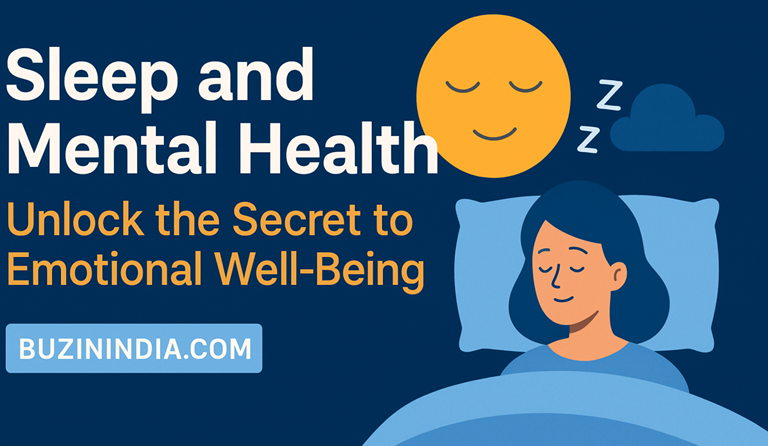Sleep and Mental Health: In today’s fast-paced lifestyle, quality sleep has become a luxury for many. But did you know that your sleep is closely tied to your mental health? From managing stress to reducing the risk of anxiety and depression, a good night’s rest plays a powerful role in shaping your emotional well-being. Let’s explore how sleep and mental health are connected and how you can improve both.

Table of Contents
🌙 The Science Behind Sleep and Mental Health
Sleep is not just a time for your body to rest—it’s a process where your brain restores itself. During deep sleep and REM sleep, your mind processes emotions, stores memories, and repairs neural pathways. When sleep is disrupted, the brain struggles to regulate mood, focus, and decision-making, leading to irritability and poor mental health.
- Lack of sleep = higher stress hormone (cortisol) levels.
- Good sleep = better emotional regulation, improved focus, and resilience against anxiety.

🧠 Common Mental Health Issues Linked to Poor Sleep
- Depression – Insomnia is often an early warning sign of depression. People who sleep less than 6 hours a night are more likely to feel persistent sadness.
- Anxiety – Restless nights make the brain more alert, creating a vicious cycle of worry and sleeplessness.
- Bipolar Disorder – Disturbed sleep can trigger mood swings and worsen symptoms.
- Stress & Burnout – Without adequate rest, your brain fails to recover from daily stress, leaving you mentally exhausted.

🌿 How Better Sleep Boosts Mental Health
- Enhances mood stability: Quality sleep reduces mood swings and promotes positivity.
- Improves memory & learning: Deep sleep strengthens cognitive functions.
- Strengthens coping ability: A well-rested brain manages stress more effectively.
- Supports emotional balance: Adequate sleep helps regulate brain chemicals like serotonin and dopamine.

🛌 Tips to Improve Sleep and Mental Health
- Maintain a sleep schedule – Go to bed and wake up at the same time daily.
- Create a bedtime routine – Reading, meditation, or listening to calming music signals your brain to relax.
- Limit screen time – Blue light from phones and TVs suppresses melatonin, making it harder to fall asleep.
- Watch your diet – Avoid caffeine, alcohol, and heavy meals before bedtime.
- Exercise regularly – Even light activities like yoga or walking can promote better sleep.
- Create a sleep-friendly environment – Keep your bedroom dark, cool, and quiet.

💡 Final Thoughts
Sleep and mental health share a two-way relationship—poor sleep can worsen mental health issues, and mental health struggles can disrupt sleep. By prioritizing restful sleep, you not only recharge your body but also protect your emotional well-being. If you are struggling with persistent sleep problems or mental health concerns, consulting a healthcare professional is highly recommended.
👉 Remember: Better sleep = Better mind, Better life!
Explore the science, common issues, and tips to improve sleep naturally
